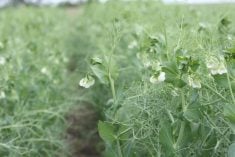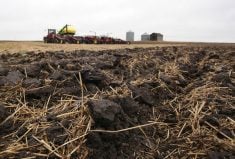Glacier FarmMedia – Canadian agriculture was more climate friendly last year, according to the latest report from the RBC Climate Action Institute.
The report, announced earlier in January, scored Canadian agriculture at 129 in 2024 on the institute’s climate action index, which measures climate progress. That compares to 125 in 2023.
The index measures the ag sector’s progress addressing climate change across four categories — policy, capital, action and emissions. Each category’s contribution is weighted at 25 per cent of the total score.
Read Also

Farmers asked to keep an eye out for space junk
Farmers and landowners east of Saskatoon are asked to watch for possible debris in their fields after the re-entry of a satellite in late September.
Over the last five years, the institute noted, agriculture’s score has grown from 100 in 2019, a 29 per cent jump.
There’s been less change on the policy side. The report weighed agriculture’s policy landscape at a steady 38 on the index from 2023 to 2024.
“Climate policy, especially from the federal government, has been a catalyst for capital investments and on-farm action,” the report read.
At the same time, it said “this activity has yet to make a dent in emissions as annual efficiencies have not tipped the scale, disruptive technologies are not mainstream and current GHG accounting does not capture all innovations on farm.”
The institute did mark progress earlier in the decade, however, pointing to climate policy starting in 2020 and the impacts of the federal government’s controversial goal to lower nitrogen fertilizer emissions by 30 per cent below 2020 levels by the end of the decade.
Agriculture’s capital score received a bump, from 31 in 2023 to 32 in 2024. That was largely credited to the On-Farm Climate Action Fund, a $329 million top-up to the Agricultural Clean Technology program, and private investments in various technologies and products. Those types of investments have driven the capital score up 28 per cent over the past five years.
Agriculture’s action score has gone from 31 to 34, driven by efficiency gains in fuel use and animal production and advanced fertilizer management.
While the trend is positive, the report also said widespread action “is moving at a slow pace as climate innovations work their way across Canada’s nearly 190,000 farms.”
Agriculture’s emissions score remained at 25, with the institute estimating that levels have flatlined at 69 megatonnes in 2024.
Canadian Agriculture Policy Institute managing director Tyler McCann said there has been minimal change in the index from 2023 to 2024.
“I think, ultimately, there’s a recognition that there’s a lot happening, and they increased the action from 2019, which was their baseline year,” said McCann.
The 29 per cent jump over the last five years makes sense to him, given the increased spending on sustainable agriculture from the Canadian government.
“But action is slowing and I think action is getting harder. And I think it highlights that emissions in agriculture in particular are really challenging and tough to turn around.”
When it comes to the future, McCann said “it’s complicated, and it’s hard to really see what we can do to have a significant impact without compromising other social and economic settings.”
Nick Betts, managing director of the Canadian Alliance for Net Zero Agri-food, said farming is an interesting sector.
“It is very dependent on market conditions, and I think this report accurately reflects where agriculture sits — right down to some of the details they touch on,” said Betts.
“And I think it just really emphasizes the fact that it is such an integral sector to Canada, but also to how we’re addressing climate and where we can address climate in a way that’s a huge opportunity both environmentally, but also economically.”
Over the last few years, Betts said Canada has inched up slowly on climate action in agriculture. In his view, though, it needs to inch up faster.
Agriculture Canada confirmed on Jan. 2 it spent $223 million more on science and innovation in the 2023-2024 fiscal year than it did in 2020-2021.
Those figures drew some criticism from agriculture because it also revealed that the increase was dedicated to greenhouse gas emissions in agriculture and did not look at other avenues of innovation such as new scientist hires or innovations such as gene editing.
“If money is taken out of field-ready cultivar development, what happens is we start lagging behind the rest of the world and our farmers become less competitive?” Robert Graf, a former winter wheat breeder with Agriculture Canada in Lethbridge, said in a conversation with the Western Producer last month.
“Part of sustainability is also the ability of farmers to … make some money. (That) used to be talked about a lot more.”

















